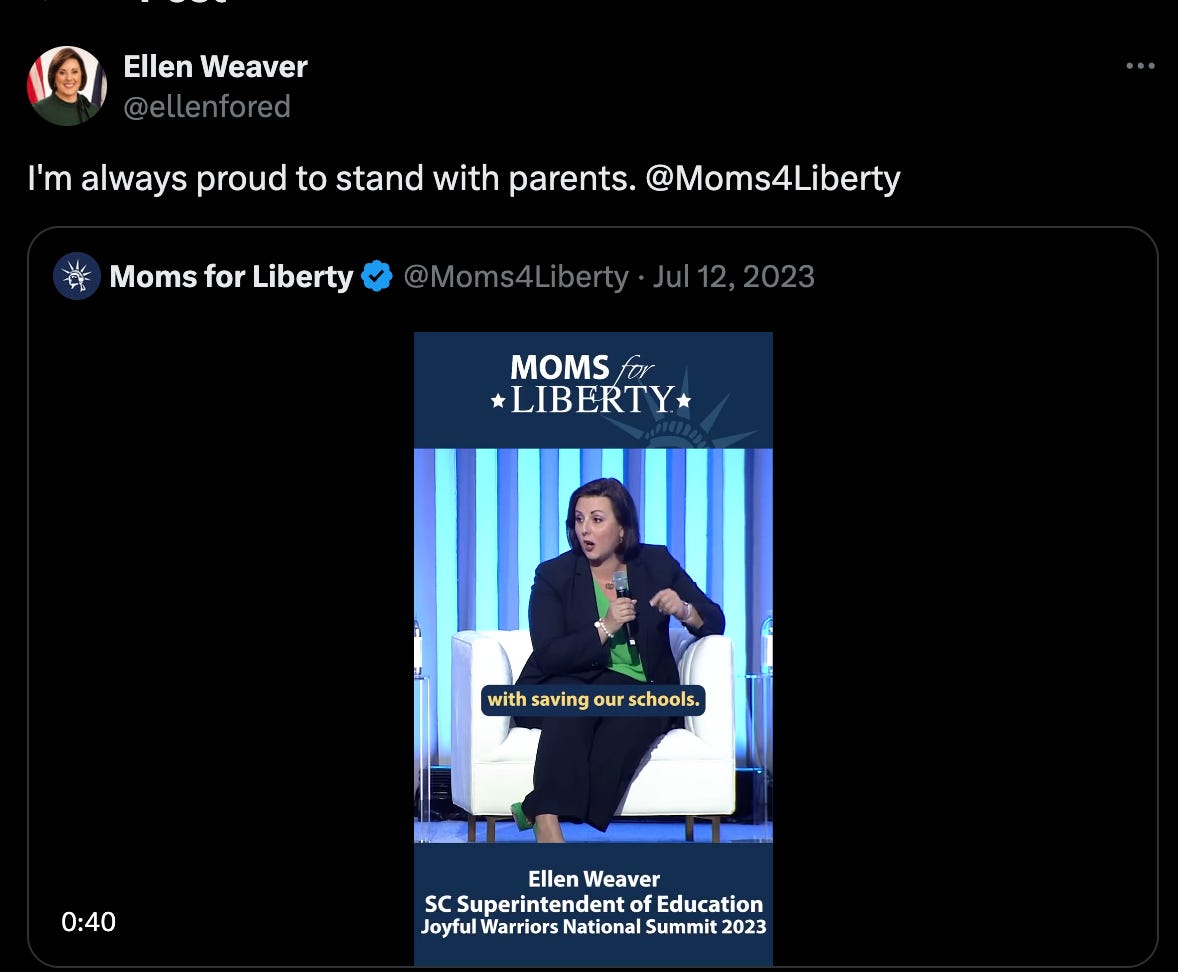South Carolina poised to impose draconian censorship regime on school libraries
On Tuesday, the South Carolina State Board of Education will impose a centralized and expansive censorship regime on every K-12 school library in the state. The new regulations could result in the banning of most classic works of literature from South Carolina schools — from The Canterbury Tales to Romeo and Juliet to Dracula. The rules were championed by South Carolina State Superintendent of Education Ellen Weaver, who is closely aligned with Moms for Liberty, a far-right advocacy group seeking to remove scores of books from school libraries.
The regulations restricting library books, which were first proposed by the State Board of Education in September 2023, would ban any instructional materials, including library books, that are not "Age and Developmentally Appropriate." The term "Age and Developmentally Appropriate" is defined as "topics, messages, materials, and teaching methods suitable to particular ages or age groups of children and adolescents, based on developing cognitive, emotional, and behavioral capacity typical for the age or age group." This definition is so broad and subjective that it could justify the removal of virtually any material.
Further, any library books (or other instructional materials) are automatically deemed "not 'Age and Developmentally Appropriate' for any age or age group of children if it includes descriptions or visual depictions of 'sexual conduct,' as that term is defined by Section 16-15-305(C)(1)." Critically, the regulations ban library books with any descriptions of "sexual conduct" whether or not those descriptions would be considered "obscene." Under the South Carolina law, a library book is not considered obscene if it includes descriptions of "sexual conduct" if it has "serious literary, artistic, political, or scientific value" or if the book, taken as a whole, does not appeal to a "prurient interest in sex." This means that classic texts that contain descriptions of sexual content, including The Bible and Ulysses, are not considered obscene.
The new South Carolina regulation refers only to Section 16-15-305(C)(1), which defines "sexual conduct" as "vaginal, anal, or oral intercourse, whether actual or simulated, normal or perverted," "masturbation," or "an act or condition that depicts actual or simulated touching, caressing, or fondling of, or other similar physical contact with, the covered or exposed genitals." Starting tomorrow, any book that contains any descriptions of "sexual conduct" that meets that sweeping definition is required to be banned from South Carolina schools, regardless of whether it has literary merit or would be considered obscene.
Similar language in an Iowa law "resulted in mass book bans affecting classics, 20th-century masterpieces, books used in AP courses, and contemporary Young Adult novels."
The enforcement of the new regulation is highly centralized. Any South Carolina parent with a child enrolled in a public K-12 school can challenge up to five books per month on the grounds that they contain descriptions of sexual content or are otherwise not age-appropriate. The school district board is then required to hold a public meeting within 90 days to consider the complaint. At the meeting, the school district board is required to announce whether or not it will remove the book. If the school district board decides not to remove the book, the parent can appeal to the South Carolina State Board of Education. After the State Board receives the appeal, it must publicly consider it no later than the second public meeting.
If the State Board decides that the book should be removed, that decision is binding not only on the school district where the complaint originated by all K-12 schools in South Carolina. Any school employee who fails to comply with the bans will be subject to discipline by the State Board. The State Board is empowered to impose any punishment, including termination, that it deems appropriate.
The regulations are opposed by over 400 authors, prominent book publishers, and free speech groups.
Moms for Liberty's influence in South Carolina
Weaver is a close ally of Moms for Liberty, which has advocated across the country to remove books from school libraries. She appeared at the Moms for Liberty 2023 Joyful Warriors National Summit. "There is nothing more precious that God has created than the hearts and the minds of our young people," Weaver said. "And that is what the radical woke left is after. Make no mistake: saving our country starts with saving our schools."
Many of the books challenged by Moms for Liberty activists address racial or LGBTQ issues. Earlier this month, Weaver's department announced it would "eliminate Advanced Placement African American Studies in [South Carolina] high schools."
The South Carolina Association of School Librarians (SCASL) opposes Weaver's efforts to impose a centralized censorship regime on school libraries. In response, Weaver wrote to the group and declared that "the South Carolina Department of Education will formally discontinue any partnerships with SCASL as an organization, effective immediately." The SCASL has collaborated with the South Carolina Department of Education for over 50 years. Weaver said the move was punishment for suggesting her efforts to remove library books amounted to a "ban" or a "violation of educators’ intellectual freedom."
Weaver's regulation goes even further than other states with leaders who are aligned with Moms for Liberty. In Florida, Governor Ron DeSantis (R) is a top ally of Moms for Liberty, and he has taken extensive steps to restrict school library books. But even in Florida, book challenges are handled at the school district level, and the law requires the removal of books that are considered obscene — not all books with any sexual content.
The $225/hour consultant
South Carolina's new regulations were drafted by attorney Miles Coleman, an attorney and the president of the local chapter of the Federalist Society, a far-right legal organization. According to public records published by the South Carolina ACLU, Weaver personally requested a contract that paid Coleman $225 per hour to create and advocate for the regulations.
Coleman then appeared before the State Board to advocate for the regulations and claimed he had "no dog in the fight."
Coleman told the Post & Courier in April that the regulations have "carveouts" for "materials with artistic or academic value." But such language does not appear in the regulations or the statutory provisions referenced in the regulations.
The legislature stays on the sidelines
The South Carolina General Assembly has 120 days to review a proposed regulation. Typically, for a controversial regulation like the one proposed by the State Board of Education, the legislature would either hold a vote to approve or reject the regulation. Absent that, the legislature could freeze the regulation to give them more time to act. In this case, however, the legislature adjourned in May without considering the regulation at all. Therefore, the regulation is slated to go into effect automatically on June 25.
It's unclear why the legislature failed to take action, but some South Carolina Republicans are calling on Weaver to withdraw the regulation to give the legislature more time. “Regulations proposed by agencies should go into effect only after being vetted by the legislature,” South Carolina Senator Tom Davis (R) said. “Superintendent Weaver should withdraw [the regulation] and resubmit it in January 2025."





More evidence that the radical right believes its path to permanent power is to ensure that the next generation is more ignorant, less able to compete, and more whitewashed than the current one.
Thanks for keeping us updated on these school library takeovers. I had not realized Iowa was already in on it.
Is this part of the move to replace public education with more compliant charter schools?
Here in Vermont the Republican governor has named his new commissioner education — a woman from Florida who Was in charge of the infamous Broward county school district. She is also heavily involved in the national charter school movement.
She was voted down 19-9 by the state senate committee required to approve cabinet nominations so he appointed her anyway as “interim Director“.
This illegal move has now been challenged by two state senators who have correctly pointed out that the governor has exceeded his authority by appointing an unapproved charter school advocate to the top state education position.
Will be continued in Vermont courts.
So keep on keeping us posted nationally!